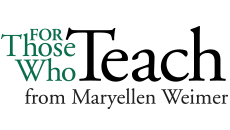Has teaching improved? It’s a question I’ve been putting to myself here on the backside of a long career. Without beginning benchmarks it’s hard to say for sure, maybe a bit, but not as much as it could or should. My feelings were reinforced by a “Faculty Forum” recently published in Teaching of Psychology: “We argue that psychology as a discipline continues to neither prioritize nor value the development of effective teaching and the advancement of effective teaching as it should,” (p. 239). The issues the eight authors identify as needing to be addressed in psychology apply to the practice of teaching, dare I say, in every field.
 We often underestimate the complexity of and rigor needed for effective teaching. It’s much more complicated and difficult to teach well than most faculty think. We still fuss with teaching mostly around the edges—experimenting with new techniques, quick solutions, and easy answers. Too few teachers have gone to the middle and challenged the enduring model of teaching as transmission.
We often underestimate the complexity of and rigor needed for effective teaching. It’s much more complicated and difficult to teach well than most faculty think. We still fuss with teaching mostly around the edges—experimenting with new techniques, quick solutions, and easy answers. Too few teachers have gone to the middle and challenged the enduring model of teaching as transmission.
We tend to neglect to apply the findings and methods of our discipline to our craft. Psychologists study attention, learning, memory, and measurement—all with findings relevant to teaching—so perhaps they’re guiltier than most, but teaching, in a broad sense, continues to be largely uninformed by the impressive knowledge base that should be the foundation on which instructional practice rests.
We often fail to stay current in best practices. Most teachers still go to class not having done any or very much reading about teaching and learning. It’s not required and there’s never a quiz nor incentive, so teaching practice tends to rest on an eclectic, idiosyncratic knowledge base that contains untested assumptions, misunderstandings, and myths—all with the potential to compromise efforts to learn.
We tend to hold teaching to lower standards than research. Yes, that’s one of the consequences of valuing research over teaching. But it’s also the result of the fundamental belief that teaching is easier than research. You can be “trained” to teach in one short course, but expertise develops across many long courses. Meanwhile, mediocre teaching doesn’t deter professional advancement, especially when one’s productive on the research side of things.
We tend to ascribe lower value to pedagogical scholarship than traditional research. Although we’ve made some progress—pedagogical scholarship used to not count at all and in most places now counts for something— it still isn’t considered as credible as “regular” research and scholarship. And if instructional research is considered second-class, doesn’t that excuse faculty from paying much attention to it?
We tend to provide insufficient training for those entering academic careers. Most places do now offer some type of training for new faculty, which is an improvement, but “training” implies teaching is a set of skills and concrete actions, like those needed to administer CPR, change a tire, or make a mousse. Teaching does involve skills. That’s where excellence begins; it’s miles from where it ends.
We often don’t provide adequate professional development for those already in the profession. Yes, many colleges and universities now have teaching and learning centers—another sign of progress. Are they adequately staffed? Do they have budgets commensurate with their mission? Is there an expectation that all faculty will take advantage of the resources and services they provide? Chances are better that professional development is optional, offered by a small staff in an under-budgeted center whose existence largely depends on having a teacher-friendly administrator.
We experience little external reward for high-quality teaching. Beyond the paycheck, there are opportunities for maybe a few teaching awards, often with unclear criteria. These awards come once in a career and include a nice lunch, a plaque, and a small check.
We have not yet articulated a teaching model that reasonably describes effective teaching. “If we do not have a clear vision of what makes teachers effective, how can we adequately recognize, defend, or celebrate accomplished teaching?” (p. 242) Good question, and one we will answer better if we work on it across disciplines, not only within them.
I know, it’s not a particularly upbeat column but across the board, I don’t think we can say efforts to improve teaching have been a smashing success. Do you agree?
Reference: Chew, S. L., Halonen, J. S., McCarthy, M. A., Gurung, R. A. R., Beers, M. J., McEntarffer, R. and Landrun, R. E. (2018). Practice what we teach: Improving teaching and learning in psychology. Teaching of Psychology, 45 (3), 239-245.







One Response
I whole-heartedly agree with the points above, and would add one more. Assessing teaching effectiveness requires that we have not only an agreed-upon definition of what that effectiveness entails, but we also need a reliable and accurate way to evaluate learning in our students. Obviously, the two most often used means of evaluating teaching , course marks and student evaluations, are inadequate.